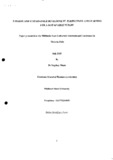Please use this identifier to cite or link to this item:
https://cris.library.msu.ac.zw//handle/11408/1560| Title: | Tourism and sustainable development : perpectives and learning for sustainable future: Paper presented at the Midlands State University International Conference in Victoria Falls |
| Authors: | Nhuta, Stephen |
| Keywords: | Sustainable Tourism, Environmental impact, Socio cultural heritage, Host Communities |
| Issue Date: | 2015 |
| Publisher: | Midlands State University |
| Abstract: | It is true that after years of significant economic, environmental, socio cultural and historical degradation, thoughtful tourism development and a new approach to community regeneration, is emerging and is basically to transform communities. This paper will focus on place based tourism through an educational platform concerned with supporting whole communities through creative and innovative sustainable tourism development practices. There is a growing need in communities to create well developed and thoughtful tourism planning and development strategies. Tourism can impact a community negatively and yet many people see only positive results from bringing visitors to their existing and potential destination. The goal of the sustainable tourism planning and development is to prepare current and future leaders with knowledge necessary to build and shape a successful, sustainable visitor destination The objectives of the paper are to: ✓ Provoke the discussion of tourism development in terms of place making rather than place taking ✓ Ascertain a sustainable approach to tourism ✓ Encapsulate regeneration and restoration the community of place. ✓ Identify issues impacting on destinations and develop an understanding of what sustainable tourism can mean to a community Discussion of the paper revolves around creating a type of tourism that emphasizes the distinctiveness of its locale, and that benefits visitor and resident alike. It would also look at working with local businesses and civic groups to promote and provide a distinctive, authentic visitor experience. As local people develop pride and skill in showing off their locale, tourists get more out of their visit. The community will in turn benefit through the use of the local workforce, services, and products and supplies. Tourism revenues in turn will raise local perceived value of those assets. Conference participants will learn that destinations should remain unspoiled for future generations while allowing for enhancement that protects the character of the local community. In other words tourism revenue can promote conservation and extends that principle beyond nature travel to encompass culture and history as well as all distinctive assets of a place. The paper presents a learning initiative that prepares decision makers and shapers to thoughtfully develop and regenerate their communities using sustainable tourism principles. Sustainable Tourism practices can bring long term business and environmental benefits to a community through encouraging sustainable use of our natural and cultural heritages. The paper intends to promote the concept of responsible tourism where people are reminded to leave a smaller footprint in the destinations they visit. If we are to experience a livable, higher quality of life for future generations, we must sustain our social, economic, cultural, and environmental resources. The recommendations would be to develop a new network of thinking and linking that seek to define problems and explore solutions to community sustainability. Other recommendations would consider issues like ways to restore and operate the Arts and Cultural Centers which are essential in the protection and promotion of cultural resources. In conclusion the paper recognizes the necessity to educate communities about sustainability and sustainable principles.Leadership, creativity, collaboration, commitment, and social accountability from all sectors of the community will produce knowledge and practices that will prove to be effective and successful in achieving the aims of sustainable development. |
| URI: | http://hdl.handle.net/11408/1560 |
| Appears in Collections: | Conference Papers |
Files in This Item:
| File | Description | Size | Format | |
|---|---|---|---|---|
| nhuta6.PDF | Full Text | 179.8 kB | Adobe PDF |  View/Open |
Items in MSUIR are protected by copyright, with all rights reserved, unless otherwise indicated.



